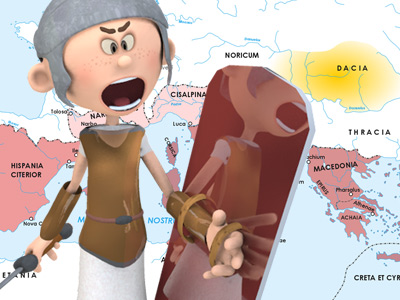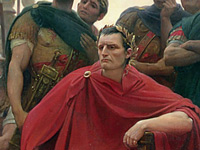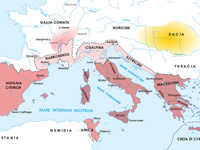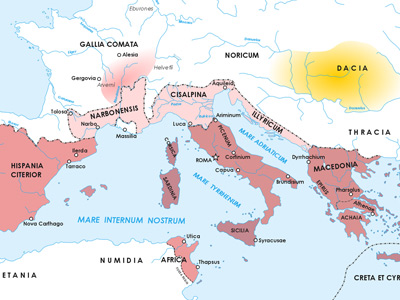Great Roman Civil War (49–45 BC)

Crossing the Rubicon
On 10 January 49 BC, leading one legion, the Legio XIII Gemina, General Julius Caesar crossed the Rubicon River, the boundary between the Cisalpine Gaul province to the north and Italy proper to the south, a legally proscribed action forbidden to any army-leading general. The proscription protected the Roman Republic from a coup d'état; thus, Caesar's military action began a civil war.
This act of war on the Roman Republic The Roman Republic was a form of government of Rome and the era of the classical Roman civilization when it was run through public representation of the Roman people. Beginning with the overthrow of the Roman Kingdom (traditionally dated to 509 BC) and ending in 27 BC with the establishment of the Roman Empire, Rome's control rapidly expanded during this period - from the city's immediate surroundings to hegemony over the entire Mediterranean world. by Caesar
The Roman Republic was a form of government of Rome and the era of the classical Roman civilization when it was run through public representation of the Roman people. Beginning with the overthrow of the Roman Kingdom (traditionally dated to 509 BC) and ending in 27 BC with the establishment of the Roman Empire, Rome's control rapidly expanded during this period - from the city's immediate surroundings to hegemony over the entire Mediterranean world. by Caesar Julius Caesar (100-44 BC), was a Roman politician and general who played a critical role in the events that led to the demise of the Roman Republic and the rise of the Roman Empire. Caesar is considered by many historians to be one of the greatest military commanders in history. Julius Caesar » led to widespread approval amongst the Roman civilians, who regarded him as a hero. The historical records differ about which decisive comment Caesar made on crossing the Rubicon: one report is Alea iacta est (usually translated as "The die is cast").
Julius Caesar (100-44 BC), was a Roman politician and general who played a critical role in the events that led to the demise of the Roman Republic and the rise of the Roman Empire. Caesar is considered by many historians to be one of the greatest military commanders in history. Julius Caesar » led to widespread approval amongst the Roman civilians, who regarded him as a hero. The historical records differ about which decisive comment Caesar made on crossing the Rubicon: one report is Alea iacta est (usually translated as "The die is cast").
HISTORY

RESOURCES
This article uses material from the Wikipedia article "Caesar's Civil War", which is released under the Creative Commons Attribution-Share-Alike License 3.0.
© Stories Preschool. All Rights Reserved.









